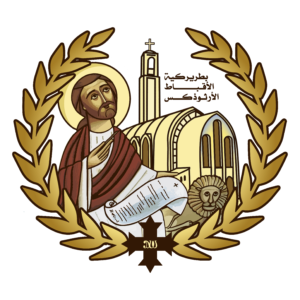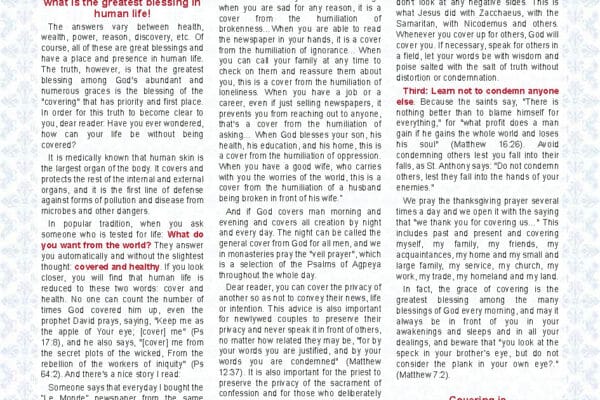H.H Pope Tawadros II preached his weakly sermon at Wednesday meeting this evening from the Papal residence in Cairo. It was aired exclusively through Cristian’s channels and C.O.C channel that is affiliated to the church’s media center via internet without any audience.
The sermon was titled by “But the meek shall inherit the earth, and shall delight in the abundance of peace” as a part of his series of musings that H.H presents threw out Psalm 37, as H.H talked about the importance of the Farewell virtue which is one of the Holy Spirit fruits. He presented a number of examples from the Holy Bible and the church’s saints whom have achieved Farewell.
H.H started from the beginning of September a new serious of sermons in his weekly Wednesday’s meeting throw out Psalm 37 titled by “Lessons of Wisdom” and the “But the meek shall inherit the earth, and shall delight in the abundance of peace” subject is the eighth lesson in this serious.
In the name of the Father, and of the Son, and of the Holy Spirit. One God. Amen. May His grace and mercy rest upon us, from now and forevermore. Amen.
Sermon Highlights:
Be meek – it is wise to be meek (gentle); meekness is not weakness
How can a person learn to be meek? 3 practices:
1-Humility
2-Gentlenss
3-Self-control (discipline)
~ Review of Psalm 37 wisdom lessons so far:
1-Do not fret over evildoers – do not be jealous or envious over them, and he repeats this lesson three times
2-Trust in the Lord
3-Dwell in the land
4-Guard the faithfulness
5-Delight in the Lord
6-Rest in the Lord and wait patiently for Him – wait patiently on the Lord, wait for Him
7-Cease from anger
8-Walk in meekness (today’s lesson)
Introduction
Let us continue our contemplations on the wisdom lessons found in Psalm 37. Psalm 37 is composed of 40 verses but we are focusing only on the first 11 verses, from which we are extracting various lessons in wisdom.
This is the eighth in our series of wisdom lessons from Psalm 37, and if you are someone who wishes to be wise and live your life according to wisdom, read this Psalm regularly and apply it in your life; study and learn its statements, teachings, and lessons. Let us read the Scripture.
Psalm 37
1Do not fret because of evildoers, nor be envious of the workers of iniquity.
2For they shall soon be cut down like the grass, and wither as the green herb.
3Trust in the Lord, and do good; dwell in the land, and cultivate faithfulness.
4Delight yourself also in the Lord, and He shall give you the desires of your heart.
5Commit your way to the Lord, trust also in Him, and He shall bring it to pass.
6He shall bring forth your righteousness as the light, and your justice as the noonday.
7Rest (be still, wait) in the Lord, and wait patiently for Him; do not fret because of him who prospers in his way, because of the man who brings wicked schemes to pass.
8Cease from anger, and forsake wrath; do not fret—it only causes harm.
9For evildoers shall be cut off; but those who wait on the Lord, they shall inherit the earth.
10For yet a little while and the wicked shall be no more; indeed, you will look carefully for his place, but it shall be no more.
11But the meek shall inherit the earth, and shall delight themselves in the abundance of peace.
The grace of God the Father be with us all. Amen.
Introduction
Today’s lesson is about being meek (verse 11), and please notice the word “abundance;” the meek will enjoy an abundance of peace, they will have a life of complete peace. A meek person will have peace in his heart, in his community, in his home, and in whatever place he is present.
Wisdom lesson #8: Be meek
The life we live requires a person to be meek. Meekness is one of the beautiful traits that the Lord Jesus Christ spoke of when He said, “Learn from Me, for I am gentle and lowly in heart, and you will find rest for your souls” (Mt 11:29). [Interesting] that despite the Lord Christ’s being the treasury, storehouse, and Source of all virtues, yet He concentrated on this very point: meekness – “Learn from Me, for I am gentle and lowly in heart.”
Meekness is [not just a single virtue] but it is an entire set of virtues; it includes calmness, kindness, being pleasant (smiling), gentleness, tenderness, peace, simplicity, obedience, humility, and love. And so meekness is a package, and this is [what we call] the spirit or life of meekness.
Undoubtedly, meekness is a fruit of the Holy Spirit, as St. Paul the apostle tells us, “But the fruit of the Spirit is love, joy, peace, longsuffering, kindness, goodness, faithfulness, gentleness (meekness), self-control” (Gal 5:22-23) – these are the works of the Holy Spirit in a person’s life.
There are many stories and characters embodying meekness in the Holy Bible and they are wonderful, and whenever we read or hear these stories, how quickly they enter into our hearts and become very dear to us. For example, let me remind you of the story of Boaz and Ruth from the Old Testament, it is one of those stories that we love very much, especially the part about Ruth and her relationship with Naomi, her mother-in-law, and how they lived a life of depending upon the Lord; it is the story of a life of fullness.
But we also especially like the part of the story with the appearance of Boaz in her life, it says: “11 And Boaz answered and said to her, ‘It has been fully reported to me, all that you have done for your mother-in-law since the death of your husband, and how you have left your father and your mother and the land of your birth, and have come to a people whom you did not know before. 12 The Lord repay your work, and a full reward be given you by the Lord God of Israel, under whose wings you have come for refuge’” (Ruth 2:11-12).
Boaz (the man who owned the land) had heard of all that Ruth had done for her mother-in-law and of her faithfulness and so he wanted to reward her, and so this is what he did, it says, “Boaz commanded his young men, saying, ‘Let her glean even among the sheaves, and do not reproach her. Also let grain from the bundles fall purposely for her; leave it that she may glean, and do not rebuke her’” (Ruth 2:15-16). Boaz wanted to give Ruth more grain, but he didn’t want to hurt her feelings or make her feel small or compelled to ask, so he instructed his reapers to on purpose let grain fall, so that Ruth could find it on her own. Such meekness [on the part of Boaz]!
Another time we see his meekness was in a statement he made to his harvesters while visiting them to check on their work, he said, “The Lord be with you.” Of course we say this to one another all the time nowadays and in every Liturgy and so on, but during that time, it was a statement of meekness, of gentleness, to say to a person, “May the Lord be with you. May the Lord help you.”
Ruth herself had a very meek and gentle way about her, we see this, for example, in how she treated her mother-in-law and how she left everything to return to her mother-in-law’s homeland with her, which was a foreign place for Ruth. She was utterly meek and obedient. We also see her meekness in her agreeing to marry Boaz, despite the great age difference between them – she being a young woman and he being an old man. Her meekness can also be seen in her love of the Lord, that she obeyed the Jewish Law to marry Boaz, leaving behind any earthly passion to marry a young man. Her meekness can also be seen in her humility when talking to Boaz; she referred to herself as “his handmaid” – a servant. She said, “I am Ruth, your maidservant. Take your maidservant under your wing, for you are a close relative” (Ruth 3:9).
Boaz and Ruth are wonderful examples for us; templates for a life of meekness and gentleness. In our Psalm he says, “But the meek shall inherit the earth,” and the story of Ruth, Boaz, and Naomi shows us that truly, the meek do inherit the earth because this story continues to live with us to this day, even though it took place during Old Testament times. This story and its beauty and its meekness, has continued to live across the ages and to this day, sufficient that it was recorded and included among the Holy Books of the Holy Bible.
A person may think that meekness is weakness, but if meekness were weakness then the Holy Bible would not have glorified it to such a high degree, but rather, the Holy Bible glorifies meekness because it is a strength. A person may sometimes think that meekness is no longer effective, not in this day and age, but that in today’s world, the stronger eat up the weaker or that the more powerful people attack the weaker ones, but in reality, meekness is still effective and it truly does make its possessor inherit the earth, as I will explain to you.
In the Sermon on the Mount, the Lord Christ confirmed it saying, “Blessed are the meek, for they shall inherit the earth” (Mt 5:5), and here, in the Old Testament, it is saying the same thing: that the meek shall inherit the earth, that they will live a life that is full of delight.
Let us take for example St. Moses the Black. If he had not repented, do you think we would have still remembered him to this day? No way! He would have just been another criminal who appeared in history, and when his life ended so also would the memory of him come to an end and no one would have ever remembered him beyond that, and no one would have even wanted to remember him.
But as he repented and his meekness became more and more apparent over the course of his repented life, the result is that his name continues to live with us to this day and we name churches and many places after him, both inside and outside Egypt, and whenever we think of repentance, his name quickly comes to our minds. To this day we continue to commemorate him, and to this day we mention his name during many Liturgical Praises. He inherited the earth. He inherited the earth in every generation. We remember him and we ask for his intercessions, and all of this because of the holiness and meekness by which he lived his life.
The Holy Bible tells us, “The righteous man will be remembered forever” (Ps 112:6), meaning that a person who lives a life of righteousness and holiness will be remembered forever, continually, he will never be forgotten. We have many other examples of those who lived in such a way and we remember them to this day, for example, St. Anba Anthony, father of monasticism; Anba Paula, father of the cenobites; St. Anba Bishoy, the beloved of our Good Savior – their memories and lives and virtues remain with us to this day. They have inherited the earth.
And there were surely many great and powerful people during the time of St. Anba Anthony, but where are these people today? Nobody knows their names or even hears anything about them, while the meek Anthony, his life is remembered to this day.
Meekness is not weakness. Meekness is a form of strength that keeps the memory of the one who possesses it in continuity, on and on across the ages, and as such, that person truly inherits the earth, for all that they have done.
Another example of meekness from the Old Testament is the prophet Samuel. The people asked him to anoint a king over them so that they could be like the other nations around them. God was their King, but they wanted to be like the idolatrous nations around them. Samuel advised them against it but they said, “No, we want to be like the other nations, we are no less than they are. We want a king … Give us a king to judge us” (1 Sam 8:6).
In those days, a judge was in the position of a ruler or a president, and so as a judge, Samuel was in fact their leader, but he was now being asked to select and anoint their next leader (their first king), Saul. And this is the wonderful statement Samuel responded with to the people during this time when they were refusing both him and God, he said, “As for me, far be it from me that I should sin against the LORD in ceasing to pray for you; but I will teach you the good and the right way” (1 Sam 12:23).
It was out of meekness that Samuel was able to respond to them and their refusal of him in this way, that even though you people refuse me and refuse God, yet as for me, far be it from me to commit this great sin before the LORD and cease from praying for you.” This is the image of what a meek and confident person looks like.
And yet, when a day came that King Saul offered sacrifices – something only priests were to do – we hear that the meek Samuel rebuked King Saul and said, “Samuel said to Saul, “You have done foolishly. You have not kept the commandment of the LORD your God, which He commanded you. For now the LORD would have established your kingdom over Israel forever. But now your kingdom will not endure; the LORD has sought a man after His own heart and appointed him ruler over His people, because you have not kept the command of the LORD” (1 Sam 13:13-14) – speaking of the prophet David, who succeeded Saul as king. And so I want you to know that to be meek does not mean to be subservient, not at all.
A meek person is a person who is very intelligent, but he has chosen meekness as his way of life. The prophet Samuel was like this; he chose meekness as his way of life and he lived by it, but when a situation arose that demanded him to rebuke the king for having made a wrong choice, he did so, and went so far as to even speak the harsh truth to him that his kingdom would come to an end and that God would start anew with another man, a man after God’s own heart.
The meekness of a person is their gentleness, it is one’s calm, beautiful, and delicate way of being with others, a way of being with others that wins them over to you. And I want to carry this all the way to the example of the Lord Christ Himself, who said to us in the Gospel of St. Matthew, “Learn of Me for I am meek and lowly in heart” (Mt 11:29), and upon His entry into Jerusalem on Palm Sunday it says, “Behold, your King is coming to you, Lowly, and sitting on a donkey, a colt, the foal of a donkey” (Mt 21:5). During those days, horses were symbols of power, but the Lord Christ used a donkey, moreover, the foal of a donkey, and a donkey is always characterized by its humility and peacefulness. It is a calm animal.
The Lord Christ likened Himself to a Shepherd, that is, peaceful, gentle, meek, and compassionate. Of Him the Scripture said: “He will not cry out or raise His voice, nor make His voice heard in the streets. A bruised reed He will not break, and smoking flax He will not quench; He will bring forth justice for truth. In his teaching (in His Name) the islands (the lands) will put their hope” (Isa 42:2-4). This means that where there is even a sign of little hope, Christ encourages, He supports, He gives strength, He brings up the positive aspects of the person standing before Him, [and so it should be with us]. And we see that even when Judas came to hand Him over, Christ did not rebuke nor insult Judas but rather said, “Friend, why have you come?” (Mt 26:50). Yes, he has come, but he is coming to betray You! Yes, but He still called him “friend.”
Every time we see Christ, we see a very powerful image of what meekness looks like. For example, even while on the cross, surrounded by this one cursing and that one spitting and so on and so forth, and yet Christ said, “Father, forgive them; for they know not what they do” (Lk 23:34).
Notice that meekness is a way of life, and the prophet David here tells us that it is the meek who end up winning at the end; they inherit the earth and will delight in an abundance of peace. And so when it is all said and done, the meek ones will be the winners; the meek person wins both the inheritance of the earth (later), as well as an abundance of peace (now).
There are some circumstances when a meek person has to be firm, for example in the instance of the cleansing of the temple, it says, “Then Jesus entered the temple courts and began to drive out those who were selling there. He declared to them, ‘It is written: “My house will be a house of prayer.” But you have made it “a den of robbers”’” (Lk 19:46-47). Christ was firm.
Or another time, when He spoke about the cities that did not believe in Him, He said, “Woe to you, Chorazin! Woe to you, Bethsaida!” (Mt 11:21) … “And you, Capernaum, who are exalted to heaven, will be brought down to Hades” (Lk 10:15). Or another time when in Jerusalem, where they were preparing for crucifying Him, He said, “O Jerusalem, Jerusalem, the one who kills the prophets and stones those who are sent to her! How often I wanted to gather your children together, as a hen gathers her brood under her wings, but you were not willing! Look, your house is left to you desolate” (Lk 13:34-35).
Also, on many occasions He described the scribes and Pharisees as “Serpents, brood of vipers!” (Mt 23:33), which are snakes, and so He was essentially calling them “wicked.” At other times He called them “hypocrites” (Mt 23:13), saying that they were living in hypocrisy and insincerity – “But woe to you, scribes and Pharisees, hypocrites!”
And so in conclusion, meekness is a characteristic of a wise person. If you want to be wise then be meek, in every sense of that word.
How can a person learn to be meek?
1-Humility
And now I would like to speak with you about how a person can learn meekness. Without a doubt, you must first of all be humble –a proud person cannot be meek. Your humility will produce or give rise to meekness for you.
Let us once again review the words of St. Paul which we pray every morning as part of the Agpeya Baker Prayers, and notice that this is a purposefully selected section of Scripture from among 100s of chapters in the Bible, but we read it every day, we say, “1 I, therefore, the prisoner of the Lord, beseech you to walk worthy of the calling with which you were called, 2 with all lowliness and gentleness, with longsuffering, bearing with one another in love, 3 endeavoring to keep the unity of the Spirit in the bond of peace. 4 There is one body and one Spirit, just as you were called in one hope of your calling” (Eph 4:1-4).
A person who does not practice these things cannot be meek, but on the contrary, because of his lack of humility he will also be lacking in meekness and so he will continually be losing people and relationships. And even if he appears to others to be very successful, but because he is not meek, the result will be is that he will lose this person today and that relationship tomorrow, and so on, but the meek shall inherit the earth.
St. Paul the apostle tells us to “walk worthy of the calling with which you were called.” Of course each one of us has a different calling; God has called each one of us to a different work and responsibility. We are to “walk according to the call” and, to do it “with all lowliness and gentleness, with longsuffering, bearing with one another in love, endeavoring to keep the unity of the Spirit in the bond of peace.” This is how to do it right, and this is the picture of a person who is walking aright, who is captive to the love of the Lord.
Be humble in your speech, whether when talking with your friends, within your home, at your place of work, and so on, but let all your dealings be conducted in simplicity, in meekness, in gentleness, in honesty, with obedience, so that you may gain everyone and be a meek person because, “the meek shall inherit the earth.” And notice it says that they will “inherit” – their way they conducted their life, their leadership, their good example, their character, their lifestyle; these are the things that will inherit, or remain after them, on the earth.
I remember a story of a man who worked in a press company and had made friends with everyone there, with everyone! And when he made his transition, everyone kept saying, “He was our friend,” and not just the Christian community but everyone was saying this about him, and this despite that he was the highest person in authority at that company, but everyone there considered him to be their friend. This meek man had inherited the earth through his spirit of friendliness and humility which he practiced during his life, and so the first thing is your humility.
2-Gentleness
The second aspect of meekness is gentleness, your gentleness. [Gentleness cultivates meekness.] I want you to know that because of the abundance of technological gadgets in our day and age and our constant usage and interaction with them, this has caused our hearts to harden. Compare this to when you and I as two humans – human to human – communicate with one another. In person-to-person communications there is an exchange of emotions between us. This emotional exchange is lacking when we are with our devices. And so let us do like the generations before us did and deal with one another in person-to-person exchanges, because in this day and age, peoples’ lives and their communications have become [too] dependent upon machines, and machines do not have emotions.
No machine is going to ask me how I feel today, no machine will laugh or feel joy if I tell it a joke; that is not possible, and it is because of all these changes in how we communicate and in how we are spending more time with machines, this has led us to depart from the way of gentleness and of being gentle.
St. Paul the apostle tells us – and this he said in the first Century – “Be kind to one another, tenderhearted, forgiving one another, even as God in Christ forgave you” (Eph 4:32). Yes, as human beings, situations will arise between us as we deal with one another, but we are to forgive one another, and why? Because God forgave us in Christ. A person must be gentle, even with sinners, because your gentleness may be the very thing that will change that person, as we see in the example of the woman who sinned; it was Christ’s gentleness that transformed her.
Similarly with the Samaritan woman, and similarly even with the apostle Peter who denied the Lord several times, and yet after the resurrection Christ asked him only one question: “Simon, son of Jonah, do you love Me?” (Jn 21:15,16,17) Words so powerful, powerful enough to shake a person’s emotions [to the core]. “Yes, Lord; You know that I love You” (Jn 21:15), but Christ asked Peter this question a second and a third time, and the result was that the apostle Peter became a great evangelist and preacher and at his own crucifixion, [feeling unworthy of being crucified in the same manner as Jesus,] Peter requested that his cross be upside down.
The apostle Paul also tells us to “be ready for every good work … to be peaceable and considerate, and always to be gentle (meek) toward everyone” (Titus 3:1-2). He is speaking here about the nature of a gentle person. A gentle person will win the favor of everyone around them, and as I told you at the beginning, meekness is not weakness because it does not prevent a person from being firm when the situation demands firmness, as we saw with the Lord Jesus Christ.
3-Self control (discipline)
And so a person can learn to be meek by practicing humility, by being gentle, and also through self-control. Situations arise at work, at home, everywhere, but how can a person respond with self-control?
In and of itself, self-control elevates a person, [raises them above the situation,, this compared to when a person does not control themselves]; they will create waves, disturbances, around him or herself, separating them from those around them, waves of hatred and disapproval.
The desert fathers tell us, “Control your reactions that you may be meek. Do not take vengeance but rather, leave the matter in God’s Hand.” Control yourself because life is not just a single situation, nor is it just a single stage or experience, but no, you grow and move from stage to stage, and so how to be a person who is self-controlled.
And if you have ever wondered why our Church has so many fasts, I want you to notice how fasting relates to self-control. One of the reasons we fast often is to help us learn to control ourselves, because when you control what you eat, control what you say, and control your emotions, you will also be able to control yourself.
In First Corinthians St. Paul the apostle tells us, “And everyone who competes for the prize is temperate (exercises self-controlled) in all things” (1 Cor 9:25). Since I am walking in the way of the Lord, I must disciple myself in all things, even to the extent that a word could be inside me, on the tip of my tongue, but I will not say it because it can hurt someone or disturb them in any way, as St. Paul the apostle also said, “If food makes my brother stumble, I will never again eat meat, lest I make my brother stumble” (1 Cor 8:13). And so even when it comes to what we eat, self-control, [discipline is needed], and this is what we call “maturity” or a “mind that is serene,” which we also saw in Christ: “He will not cry out or raise His voice, nor make His voice heard in the streets. A bruised reed He will not break, and smoking flax He will not quench; He will bring forth justice for truth. In his teaching (in His Name) the islands (the lands) will put their hope.”
Humility, gentleness, and self-control are traits that will help us live out and experience the 8th wisdom lesson: “11But the meek shall inherit the earth, and shall delight themselves in the abundance of peace.” And again, I want you to please pause at the word “delight,” because a person who is meek will have a delightful life and their days will be joyous! A meek person’s days will be full of peace because all their affairs proceed peacefully.
Conclusion and Blessing
We have now studied 8 wisdom lessons from the first 11 verses of Psalm 37. Reread this Psalm often, memorize it, and study and review these lessons frequently. Know that these wisdoms are the conclusion and essence of the Prophet David’s life and life experiences, presented to you in order that you may practice them and benefit from them.
The 8 lessons we have studied so far are:
- Do not fret (be envious)
- Trust in the LORD
- Dwell in the land
- Cultivate and guard the faith
- Delight in the LORD
- Wait for Him
- Cease from anger
- Walk in meekness
May our Christ grant us to practice these wisdoms in our daily lives and to enjoy them, and may He grant that all the days of our lives be filled with wisdom. To our God be all the glory and honor, from now and forevermore. Amen.
This page is also available in:
العربية






